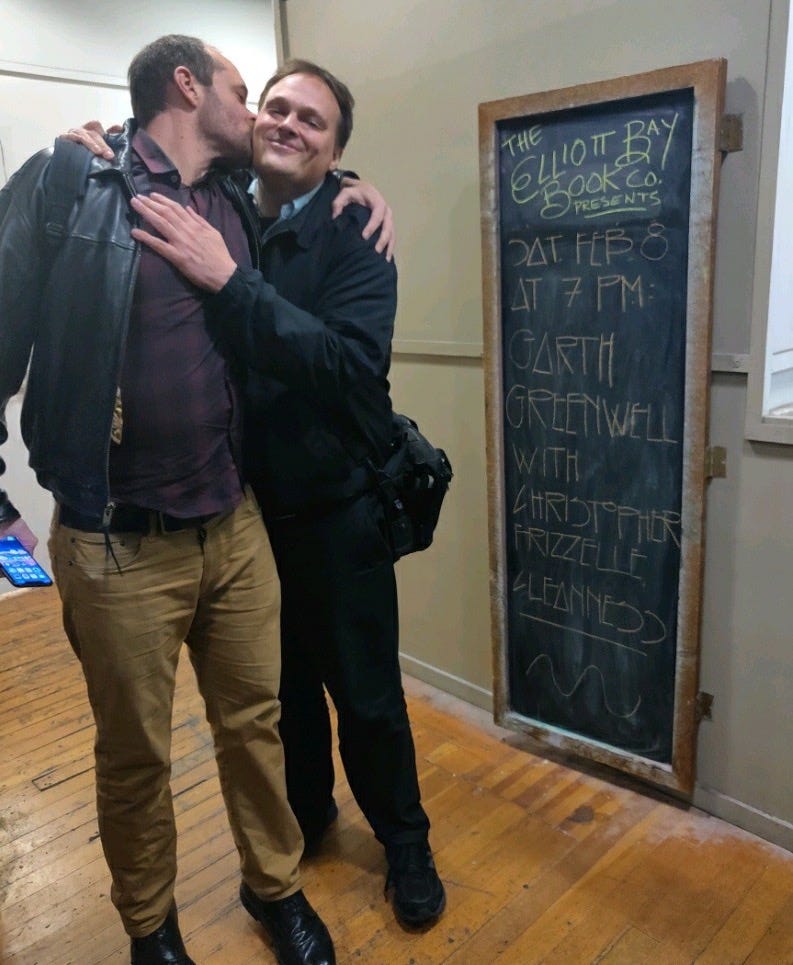Did you know Garth Greenwell has a Substack?
He does and you should follow it. Art, opera, literature, movies, queer stuff, and that distinctive voice.

If you like art, opera, literature, movies, queer stuff, New York City, or bonkers-brilliant things dripping with superfluous brilliance such that you could catch some of that brilliance in your mouth and feed on it forever, go follow
.Garth is the kind of fiction writer who makes you think: “I could kiss you.”
Have you read What Belongs to You and Cleanness? If you read The New Yorker, you may have read excerpts of them.
He’s also a brilliant essayist. If you haven’t read his recent essay on Philip Roth for The Yale Review, it's required reading.
Greenwell has been a literary It Boy for a while now—winning awards, teaching at Princeton, sitting next to the fire in Edmund White’s living room.
And going out in New York City, taking notes on what’s happening in the culture, and writing about it.
For his Substack, called To a Green Thought, he’s been going out—to the opera, to museums, to the movies—and letting you go with him.
Did you see his takedown of The Hours? Delicious.
A taste:
I felt queasy from the first notes of the score, when the chorus started singing a nauseous little “flowers” motif that was pure bargain-bin John Adams. I guess we were meant to be in Virginia Woolf’s head as the first line of Mrs Dalloway bubbled up, or something—and even that gives a sense of the opera’s facility, the unthoughtful approach it takes to profound questions. (How do great novels get written? Not like that.) I know lots of people loved this show—my social media was full of people praising it—and I don’t mean to suggest that I was unmoved. I had feelings! But they were won cheaply, and so they made me feel cheap: the opera turned me into a mechanism with strings it could pull. Show me a man with AIDS throwing himself out a window, and I’m going to cry. Put a series of descending pedal tones in the brass, swell the strings, toss in some sweetly resolving suspensions, and my heart has no choice but to respond. It was all one long, I finally felt pretty cynical, manipulation.
Now, some people might argue that art is nothing but manipulation: that all art intends for us to have an emotional response, and performs certain maneuvers to elicit it. I guess I just don’t think this is true, finally; good art doesn’t treat us like mechanisms. This is something mysterious to me, the way that great art refrains from dictating our response, the way it respects our freedom—presenting us with something too complex to coerce an uncomplicated response. The greatest art, I sometimes think, has a kind of terrifying, sublime indifference to our response.
How is Garth Greenwell not the leading Substack writer of all time?
Plus, it’s got this Plath-in-the-first-half-of-The-Bell-Jar subjective tone that I could eat off a spoon.
Don’t you love writing that sounds like this?
Everybody keeps telling me how much I love New York. I get it: my social media is full of concerts and visits to museums, the kind of things that actual New Yorkers berate themselves for not doing. There’s nothing like nine years on the Plains to light a fire. But, five months in, I’m still not sure I can bear this city.
How could you not follow that voice anywhere?
By the way
Garth blurbed on Rebecca Brown’s recent nonfiction book We Tell the Stories We Need to Believe.
You have a copy of We Tell the Stories We Need to Believe, right? If you don’t, click here.
Here’s what Garth said about Rebecca’s book:
There are no easy comparisons for this moving, strange, immensely brilliant book, save that, as with other eccentric miniaturists—Walser or Dickinson or Davis—brevity of expression belies vastness of thought. A reflection on the seasons, a meditation on time, an autobiography filtered through art, Four Seasons is finally—though there’s nothing conventionally pious about it—a prayer, its devotion bent equally toward the luminous particulars of the world and the ever deferred, ever hoped-for gifts of the spirit. I loved it more than I can say.
He loved it more than he could say!
Anyway, subscribe to and support
by one of the most talented writers not to have died yet.



